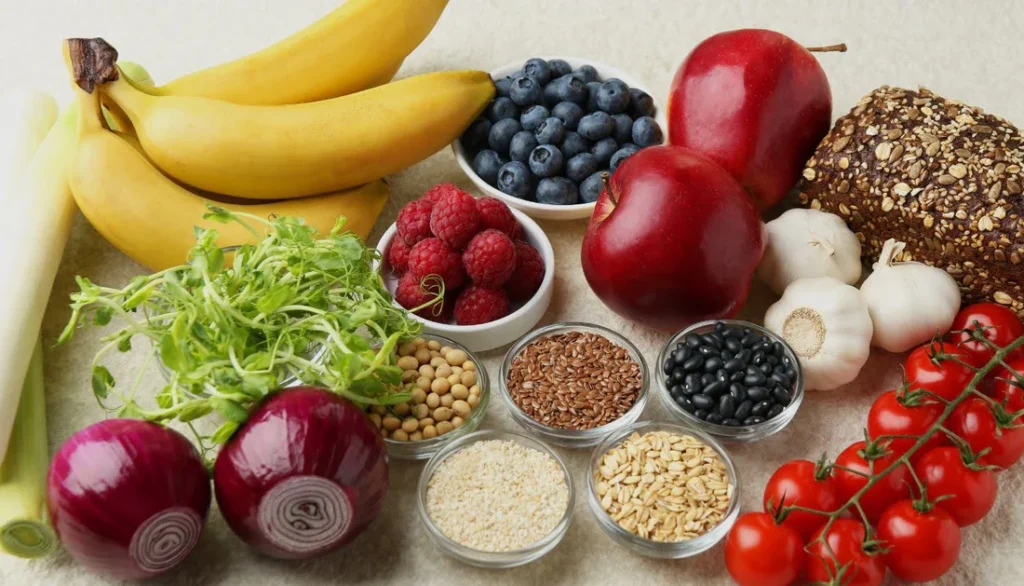
As the leaves turn golden and the air grows crisp, autumn brings a bounty of fruits that not only delight the senses but also work wonders for your digestive health. Picture yourself strolling through a farmer’s market, the scent of ripe apples and juicy pears mingling with the earthy aroma of fallen leaves. These seasonal treasures aren’t just delicious—they’re packed with nutrients that support your gut, helping you feel vibrant and energized. In this in-depth guide, we’ll explore how autumn fruits can transform your digestion, share personal stories, and provide actionable tips to make the most of the season’s offerings. Whether you’re dealing with bloating, sluggish digestion, or simply want to boost your gut health, this post is your roadmap to autumn wellness.
Why Autumn Fruits Are Gut Health Superstars
Autumn fruits are nature’s gift to your digestive system, offering a perfect blend of fiber, vitamins, and antioxidants. These nutrients work together to promote regular bowel movements, reduce inflammation, and nurture a healthy gut microbiome. Unlike processed snacks, fruits like apples, pears, and persimmons are whole foods that deliver nourishment without taxing your digestive tract. According to Harvard Health, a diet rich in fruits supports the gut-brain axis, improving both digestion and mood. My own experience mirrors this—last fall, I swapped sugary snacks for fresh apples and noticed less bloating and more energy within days. Let’s dive into the specific fruits that make autumn a golden season for your gut.
Apples: The Classic Gut Soother
Nothing says autumn like biting into a crisp, juicy apple. Apples are a digestive powerhouse, thanks to their high fiber content, particularly pectin. Pectin, a soluble fiber, acts as a prebiotic, feeding the beneficial bacteria in your gut. A study from the National Institutes of Health found that pectin helps regulate bowel movements and may reduce symptoms of irritable bowel syndrome (IBS). I remember a cozy October evening when I baked apples with cinnamon for dessert—my stomach felt calm and satisfied, a stark contrast to the heaviness of processed sweets. Here’s why apples shine for digestion:
- High in Soluble Fiber: Pectin slows digestion, preventing blood sugar spikes and promoting fullness.
- Rich in Antioxidants: Polyphenols in apples reduce gut inflammation, supporting a healthy microbiome.
- Versatile and Accessible: Whether raw, baked, or stewed, apples are easy to incorporate into any meal.
Tip: Choose organic apples when possible to avoid pesticides, and eat the skin for maximum fiber. Try slicing apples into a warm bowl of oatmeal for a gut-friendly breakfast.
Pears: Nature’s Gentle Laxative
Pears, with their soft, buttery flesh, are another autumn staple that’s kind to your digestive system. They’re loaded with both soluble and insoluble fiber, which work together to keep things moving smoothly. According to WebMD, a single pear provides about 6 grams of fiber—roughly a quarter of your daily needs. I once struggled with occasional constipation during a stressful autumn, but adding a ripe pear to my lunch routine made a noticeable difference within a week. Pears also contain sorbitol, a natural sugar alcohol that draws water into the intestines, easing bowel movements.
- Hydration Boost: Pears are 84% water, helping to soften stool and prevent dehydration-related digestive issues.
- Low Allergenicity: Pears are gentle on sensitive stomachs, making them ideal for those with food sensitivities.
- Rich in Vitamin C: Supports tissue repair in the digestive tract, reducing irritation.
Tip: Opt for ripe but firm pears to avoid excess sorbitol, which can cause bloating in large amounts. Pair a sliced pear with almond butter for a satisfying, digestion-friendly snack.
Persimmons: The Underappreciated Gut Hero
Persimmons, with their vibrant orange hue, are autumn’s hidden gem for digestion. These fruits are rich in tannins and fiber, which help regulate digestion and reduce inflammation. A study published in Food Chemistry highlights persimmons’ antioxidant properties, which protect the gut lining from oxidative stress. I discovered persimmons during a fall trip to a local orchard, and their sweet, slightly tangy flavor quickly became a favorite. They’re particularly effective for soothing an upset stomach or calming inflammation.
- Tannins for Gut Health: These compounds reduce diarrhea by slowing intestinal motility.
- Fiber for Regularity: Persimmons provide both soluble and insoluble fiber for balanced digestion.
- Vitamin A Source: Supports the mucosal lining of the gut, enhancing barrier function.
Tip: Choose Fuyu persimmons for a non-astringent variety that’s easier to eat raw. Add diced persimmons to a salad for a burst of flavor and gut benefits.
Pomegranates: The Antioxidant Powerhouse
Pomegranates, with their jewel-like seeds, are a fall favorite that pack a punch for digestive health. Their high antioxidant content, particularly punicalagins, helps reduce gut inflammation and may protect against conditions like inflammatory bowel disease (IBD). According to Healthline, pomegranates also promote the growth of beneficial gut bacteria. I recall sipping pomegranate juice during a chilly autumn hike—it felt like a treat that left my stomach settled and my energy steady.
- Anti-Inflammatory Effects: Punicalagins reduce gut inflammation, easing discomfort.
- Prebiotic Potential: Feeds beneficial bacteria, improving gut microbiome diversity.
- Natural Detox: Supports liver function, aiding in toxin elimination via digestion.
Tip: Sprinkle pomegranate seeds over yogurt or blend them into a smoothie for a gut-healthy boost. Avoid overconsumption of juice, as it’s high in sugar.
Figs: Sweet Relief for Sluggish Digestion
Figs, whether fresh or dried, are a sweet autumn treat that doubles as a digestive aid. They’re rich in fiber, enzymes, and potassium, which work together to promote regularity and prevent bloating. A study from the Journal of Nutrition found that figs can improve symptoms of constipation more effectively than some over-the-counter remedies. I started adding fresh figs to my morning toast last fall, and the difference in my digestion was remarkable—no more mid-afternoon sluggishness.
- Enzyme Power: Figs contain ficin, an enzyme that aids protein digestion.
- Potassium Balance: Supports fluid balance in the gut, preventing constipation.
- Natural Sweetness: A healthy alternative to sugary snacks that disrupt digestion.
Tip: Pair fresh figs with a handful of walnuts for a balanced, fiber-rich snack. If using dried figs, soak them in water to reduce sugar concentration.
Comparison Table: Autumn Fruits for Digestion
Autumn Fruits and Their Digestive Benefits
| Fruit | Key Nutrient | Digestive Benefit | Best Way to Enjoy |
|---|---|---|---|
| Apple | Pectin (soluble fiber) | Regulates bowel movements, feeds gut bacteria | Raw, baked, or in oatmeal |
| Pear | Fiber, sorbitol | Promotes regularity, hydrates gut | Sliced with nut butter |
| Persimmon | Tannins, fiber | Reduces diarrhea, soothes inflammation | Diced in salads |
| Pomegranate | Punicalagins | Reduces inflammation, supports microbiome | Seeds in yogurt or smoothies |
| Fig | Fiber, ficin enzyme | Relieves constipation, aids protein digestion | Fresh with nuts or soaked dried figs |
This table highlights how each fruit contributes uniquely to digestive health, making it easy to choose the right one for your needs.
Incorporating Autumn Fruits into Your Diet
Eating more autumn fruits doesn’t have to be complicated. Here are practical, delicious ways to make them part of your daily routine:
- Breakfast Boost: Add sliced apples or pears to oatmeal or yogurt. The fiber kickstarts your digestion for the day.
- Smoothie Power: Blend pomegranates or persimmons with spinach and a banana for a gut-friendly smoothie. Check out EatingWell for inspiration.
- Snack Smart: Pair figs or apples with nuts for a balanced snack that stabilizes blood sugar and supports digestion.
- Dessert Upgrade: Bake apples or pears with cinnamon and a drizzle of honey for a sweet, gut-soothing treat.
I’ve found that keeping a bowl of mixed autumn fruits on my kitchen counter encourages me to reach for them instead of processed snacks. It’s a simple habit that’s transformed my digestion over time.
The Science Behind Fruits and Gut Health
The gut microbiome, a complex community of trillions of microorganisms, plays a pivotal role in digestion, immunity, and even mental health. Autumn fruits support this ecosystem by providing prebiotics (like pectin) and antioxidants that reduce oxidative stress. According to Mayo Clinic, a high-fiber diet can lower the risk of digestive disorders like diverticulitis and colon cancer. Fruits also help maintain a healthy gut lining, preventing issues like leaky gut syndrome. By eating a variety of autumn fruits, you’re not just treating your taste buds—you’re investing in long-term gut health.
Potential Pitfalls and How to Avoid Them
While autumn fruits are generally safe, overconsumption or improper preparation can cause digestive discomfort. For example, eating too many pears or dried figs can lead to bloating due to their high sorbitol or sugar content. Here’s how to enjoy them wisely:
- Moderation is Key: Stick to 1–2 servings of fruit per meal to avoid overloading your system.
- Balance with Protein: Pair fruits with nuts or yogurt to slow digestion and prevent sugar spikes.
- Wash Thoroughly: Remove pesticides by washing fruits under running water, especially apples and pears.
I learned this the hard way after eating a handful of dried figs in one sitting—let’s just say my stomach wasn’t happy! Now, I pace myself and balance fruits with other nutrients.
FAQ: Common Questions About Autumn Fruits and Digestion
Q: Can I eat autumn fruits if I have IBS?
A: Yes, but choose low-FODMAP options like ripe pears or persimmons in moderation. Apples can be high in FODMAPs, so cook them to reduce fermentable sugars. Consult a dietitian for personalized advice, as suggested by Monash University.
Q: Are dried autumn fruits as beneficial as fresh ones?
A: Dried fruits like figs retain fiber but are higher in sugar, which can cause bloating. Soak them in water to dilute sugar content and eat in small portions.
Q: How many servings of fruit should I eat daily for gut health?
A: Aim for 2–3 servings of fruit daily, as recommended by the USDA. Combine with vegetables and whole grains for optimal digestion.
Q: Can fruit juice provide the same digestive benefits?
A: Juice lacks the fiber of whole fruits, which is crucial for digestion. Stick to whole fruits or dilute juice with water to reduce sugar intake.
Q: Are there fruits to avoid for sensitive stomachs?
A: Unripe persimmons (Hachiya variety) can be astringent and hard to digest. Choose ripe, soft fruits and avoid overeating high-sorbitol fruits like pears if you’re sensitive.
Conclusion: Embrace Autumn’s Bounty for a Happier Gut
Autumn is more than just a season of cozy sweaters and pumpkin spice—it’s a time to nourish your body with nature’s finest fruits. Apples, pears, persimmons, pomegranates, and figs offer a delicious way to support your digestive health, from easing constipation to reducing inflammation and nurturing your gut microbiome. By incorporating these fruits into your meals and snacks, you’re not just enjoying the flavors of fall—you’re investing in your long-term wellness. My own journey with autumn fruits has taught me that small, intentional changes—like swapping processed snacks for a crisp apple or a juicy pear—can make a big difference in how you feel.
To get started, visit your local farmer’s market or grocery store and stock up on these seasonal gems. Experiment with new recipes, like a pomegranate-studded salad or baked figs with yogurt, and pay attention to how your body responds. If you’re dealing with specific digestive issues, consider consulting a nutritionist to tailor your diet. For more gut-healthy recipes and tips, explore resources like Medical News Today or Cleveland Clinic. Here’s to a vibrant, healthy autumn filled with delicious fruits and a happy gut!
